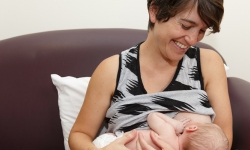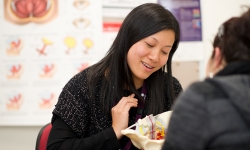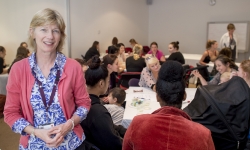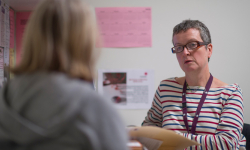We offer you a trusted source of health information
Check our web pages about women's health and our fact sheets.
We have developed a wide range of health information to help women of all ages understand their health issues and their treatment options, and to help you consider your health and wellbeing now and into the future.
Our health information is developed in partnership with health professionals, women and their families.
It is based on the most current health knowledge and is regularly reviewed, to make sure we are providing the very best and the most up to date information to help women make decisions about their health and their health care.
-
 At home with your baby
At home with your babyThe first few weeks of your baby's life can be a lovely time.
Learn more -
 Breastfeeding
BreastfeedingBreast milk provides all the nutrition that your baby needs for the first six months of their life. There are benefits for both you and your baby if you breastfeed.
Learn more -
 Breast health & breast reconstruction
Breast health & breast reconstructionBreast cancer is so common in the community that many of us will know a woman who has been affected by it. It is not surprising then that breast symptoms are so worrying.
Learn more -
 Continence
ContinenceIncontinence is a common condition that affects nearly half of all Australian women. Many women find it so embarrassing that they don’t seek medical help but there are a range of treatments that can help.
Learn more -
 Contraception
ContraceptionContraception will protect you from pregnancy. No matter what contraception you choose, you still need a condom to protect you from sexually transmitted infections.
Learn more -
 Fertility
FertilityWith regular, unprotected sexual intercourse 80 per cent of women become pregnant within a year. Even so, fertility varies from person to person and up to 15 per cent of couples experience some difficulties.
Learn more -
 Menopause
MenopauseHaving a positive outlook on menopause is helpful in managing this normal life stage.
Learn more -
 Periods
PeriodsWomen can expect to get their first period (menarche) at any time between the ages of nine and 15. All women menstruate, but the experience for each woman can be very different.
Learn more -
 Pregnancy & birth
Pregnancy & birthWe are focused on supporting women through their birth experience.
Learn more -
 Sex & sexuality
Sex & sexualityYour sexuality defines who you are and how you live your sexual life. Understanding the different parts of your sexuality can help you cope with confusing feelings.
Learn more -
 Staying well
Staying wellMost of what we do to stay well and healthy has little to do with seeing doctors or interacting with the healthcare system. Most of it is about keeping our bodies in the best shape we can.
Learn more -
 Unplanned pregnancy
Unplanned pregnancyIn this section we have aimed to reflect the experiences of women and their need for clear, impartial and evidence-based information on the choices they can make for the difficult decision to continue or terminate their unplanned pregnancy.
Learn more -
 Vaginal prolapse
Vaginal prolapseVaginal prolapse is a common condition where the bladder, uterus and or bowel protrudes into the vagina. It cause symptoms such as a sensation of a vaginal lump, constipation, difficulty emptying the bowel or bladder or problems with sexual intercourse.
Learn more -
 Violence against women
Violence against womenViolence against women is common, but it is also preventable.
Learn more -
 Vulva & vagina health
Vulva & vagina healthMost women experience some kind of genital infection or irritation at least once in their life. These conditions can be uncomfortable and embarrassing but most of them are treatable.
Learn more -
 Women’s cancers
Women’s cancersWe specialise in the treatment and research of cancers that affect women: breast, ovarian, cervical and endometrial cancers.
Learn more
Disclaimer
The Women’s does not accept any liability to any person for the information or advice (or use of such information or advice) which is provided on the Website or incorporated into it by reference. The Women’s provide this information on the understanding that all persons accessing it take responsibility for assessing its relevance and accuracy. Women are encouraged to discuss their health needs with a health practitioner. If you have concerns about your health, you should seek advice from your health care provider or if you require urgent care you should go to the nearest Emergency Dept.